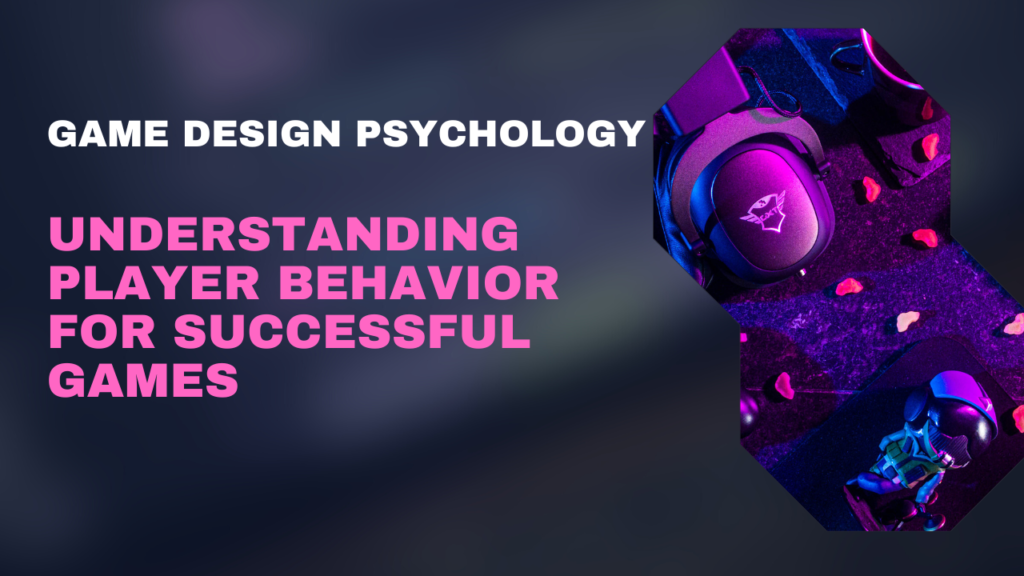
When it comes to understanding user psychology to develop better product experiences, one of the greatest sources of information is found in the game design field. For decades, game development companies have hired game app developers and designers who have been perfecting their strategies to create increasingly engaging and entertaining experiences that promote certain player behavior. Their methods are founded on a thorough study of player psychology. With time and research, game designers have created an outstanding set of mechanics that they use over and again to create addictive games.
Here are some features and characteristics of successful game design and mechanics used by a successful game design company.
The Players’ Motivation
Why do individuals enjoy playing video games? There are several motivations for this, but some of the most prevalent are to escape, accomplish, socialize, express, and learn. These motives are used by game designers working in a typical game design studio where they construct games that cater to the various demands and preferences of players.
Some games, for example, provide an immersive experience with realistic features and tales that allow players to escape reality, whilst others provide hard goals and activities that enable players to attain mastery and recognition. Some games promote social connection and collaboration, whilst others allow for individual expression and innovation. Some games teach skills and information, while others foster curiosity and exploration.
Characteristics of Players
Aside from basic incentives, game designers know that players come to a game with different personality types in search of different forms of fun. It is critical to realize this and design experiences that allow all player types to thrive in the game.
Players are often classified into four types:
- Achievers love accumulating points, levels, equipment, and other tangible indicators of success in a game. They will go to considerable efforts to obtain things that provide little gaming value merely for the sake of possessing it.
- Explorers like exploring new regions, making maps, and learning about secret locations. They enjoy taking their time exploring new regions and exploring at their speed.
- Socializers love communicating with other players, computer-controlled characters with personalities on occasion. The game is just a tool they use to meet new people, either in-game or outside of it.
- Killers like competing with other players and seek to outperform their colleagues.
Mechanics of the Game
A game designer may develop experiences that offer extrinsic incentives for each of these player kinds by knowing the varied player types inside their game. Game designers have built a set of best practices for doing so, which appear in the game mechanics they utilize to generate enjoyment and desirable behavior from their players.
Consider the following widespread game mechanics:
Achievement
The accomplishment system allows players to gain achievements, which are either virtual or real representations of what they have achieved. Players frequently regard them as prizes in and of themselves.
The accomplishment system may be found in games that use badges, levels, awards, and points. Such badges and levels may also be found in applications like Foursquare, health apps, and others.
Envy
Envy produces an experience in which a player wants to have something that another player already possesses. To make this work, a player must be able to see what other players have (voyeurism).
letting users show off their badges and levels to other players, letting players visit one another’s farms in Farmville, and general leader boards are all instances of experiences that inspire jealousy. Through voyeurism, all social goods with profile and status updates unavoidably produce some sort of jealousy with others.
Ownership
The ownership feature lets players have authority over anything or have it as their property, which they are proud of.
Controlling areas of a game board or commanding a massive army are two games that use this principle. On social products, just “owning” fame by having a huge digital representation of many friends is the equivalent of this.
Status
The status mechanism in a game allows you to have a rank or level that imparts status to the player and others.
The status mechanic at work is being able to boast to your buddies about your white paladin level 20 in WOW. GitHub presents developers’ status on their developer profiles by displaying and summarizing their contributions to various open-source projects.
Epic Meaning
The epic meaning mechanism is based on the premise that players will be more motivated if they think they are striving towards something great, something awe-inspiring, something larger than themselves.
The continuous story thread of World of Warcraft has epic importance for many of its players, resulting in such a profound connection with gamers both within and outside of the game. When you can connect the use of your product or service to such a grandiose purpose, your drive will skyrocket. For this reason, open-source developers may contribute to open-source projects.
Conclusion
The examples above show when game design companies hire game designers, they expect game designers to consider developing extrinsic incentives for their various player types using a range of recognized game mechanisms. Next time you develop a product experience, consider whether any appropriate game elements might help you speed up your targeted user behavior.

About the Author:
Ranjeet Kumar, experienced growth hacker, SEO specialist, blogger and digital marketing consultant with over 10 years of expertise in the IT industry, particularly in custom mobile app development. Passionate about sharing invaluable marketing insights and pioneering strategies within the online marketing community.